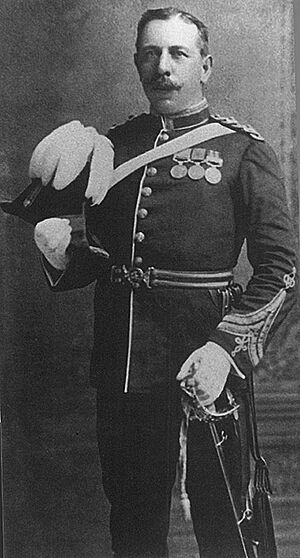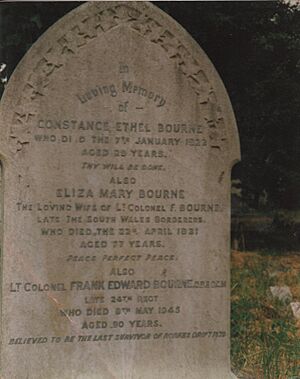Frank Bourne facts for kids
Quick facts for kids
Frank Bourne
|
|
|---|---|

Photograph of Frank Bourne taken c.1905
|
|
| Born | 27 April 1855 Balcombe, England |
| Died | 9 May 1945 (aged 90) Beckenham, London, England |
| Buried |
Beckenham Crematorium and Cemetery
|
| Allegiance | |
| Service/ |
|
| Years of service | 1872–1907, 1914–1919 |
| Rank | Lieutenant colonel |
| Unit | 24th Regiment of Foot |
| Battles/wars | Anglo-Zulu War World War I |
| Awards | Officer of the Order of the British Empire Distinguished Conduct Medal |
Frank Edward Bourne was a brave British soldier. He is famous for his part in the Battle of Rorke's Drift in 1879. This battle happened during the Anglo-Zulu War. He was born on April 27, 1855, and lived until May 9, 1945. He earned special awards for his courage.
Early Life
Frank Bourne was born in Balcombe, England, on April 27, 1855. He was the youngest of eight children. At age 17, he joined the British Army on December 18, 1872.
Just four years later, he became a colour sergeant. This was a very high rank for a young soldier. In fact, he was the youngest soldier of this rank in the whole British Army. Because of this, his friends called him 'The Kid'.
The Battle of Rorke's Drift
Frank Bourne became famous for his actions on January 22 and 23, 1879. He was part of a small group of soldiers at a place called Rorke's Drift. This was in South Africa.
A large Zulu army attacked their small mission station and hospital. Bourne was a NCO in the 24th Regiment of Foot. He helped organize the soldiers to defend the area.
The Zulu warriors attacked the barricades many times. But the British soldiers, even though they were greatly outnumbered, fought bravely. They held their ground all day and night until help arrived.
For his amazing bravery, Frank Bourne received the Distinguished Conduct Medal (DCM). This award was given for his "outstanding coolness and courage" during the battle. He also received an extra £10 each year for life.
The DCM was a very important award. Until 1993, it was the second highest military award for soldiers who were not officers. Only the Victoria Cross was higher. Frank Bourne was offered a chance to become an officer, but he chose not to.
Later Military Career
After the Battle of Rorke's Drift, Frank Bourne continued his service. He served in British India and Burma. In 1884, he was promoted again to Quartermaster-Sergeant.
In 1890, he finally became an officer. Three years later, he worked at the School of Musketry in Hythe, Kent. This was a place where soldiers learned how to shoot. He retired from the army in 1907.
When World War I started, he rejoined the army. He served again at the School of Musketry, this time in Dublin. After the war ended in 1919, he was given the special rank of Lieutenant colonel. He also received another award, the OBE. He retired for the second time at age 64.
Frank Bourne lived in Beckenham, Kent, after he retired. He was the very last soldier alive who had fought at Rorke's Drift. He passed away on May 9, 1945, at 90 years old. This was just one day after VE Day, which marked the end of World War II in Europe. He was buried in Beckenham Cemetery. There is a special blue plaque on his old house in Beckenham.
Frank Bourne in Film
In the 1964 movie Zulu, Frank Bourne's character was played by actor Nigel Green. Interestingly, Nigel Green was 17 years older than Frank Bourne was at the time of the battle. Bourne was only 23 years old during the real Rorke's Drift battle.
 | James Van Der Zee |
 | Alma Thomas |
 | Ellis Wilson |
 | Margaret Taylor-Burroughs |


